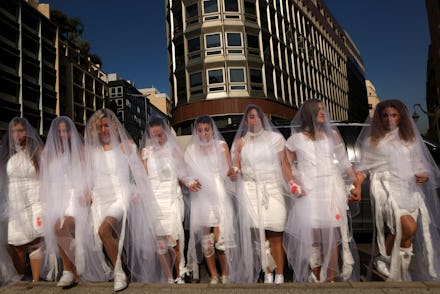Lebanon women are protesting a law which allows rapists to marry their victims

Dozens of women in Lebanon gathered outside a Beirut government building on Tuesday clad in white dresses and bandages stained with fake blood in protest of a law that allows rapists to marry their victims.
"We reject this violation of women regardless of their age, background, environment, whether they have special needs or the circumstances of the rape," Ghida Anani, head of local NGO Abaad, told the Independent. She said the law revictimizes survivors of sexual assault because if a woman marries her rapist she will have to "share her life with a person that violated her, and is hence raped every day."
Members of parliament debated the 1940s statute on Wednesday, which states that while rape is punishable by seven or more years in prison, the charges will be dropped if the alleged assailant and their victim marry.
According to the Independent, those in favor of upholding the law argue it provides an opportunity for rape victims to salvage their honor.
Lebanon isn't the only country where rapists get a virtual "get out of jail free" card by marrying their victims.
In 2014, Hind Bensari, a young Moroccan woman, created the documentary 475: Break the Silence after she learned about a 16-year-old girl named Amina Fillali who had committed suicide after being forced to marry her attacker. The film is named for Article 475, the Moroccan law that dropped criminal charges for "men who married the young women they slept with outside of marriage," according to a 2015 Women in the World report. The law had been used as justification for marriages between rapists and victims.
"Surely these behaviors will not lead to happy families or right solutions to dealing with rape," Bensari told the outlet. "As a matter of fact, such practice creates damaged families and not healthy ones. And when you talk to people from that perspective they don't feel threatened or insulted, they do respond and think about it and come to the conclusion that we don't want this to carry on."
Following the release of Bensari's documentary and the efforts of other advocacy groups, Morocco repealed the law.
Bensari told Women in the World she believes in the power of protest to effect change: good news for the women in Lebanon speaking out against their own oppressive law.
She said, "Laws are created by people and they can be changed by people."